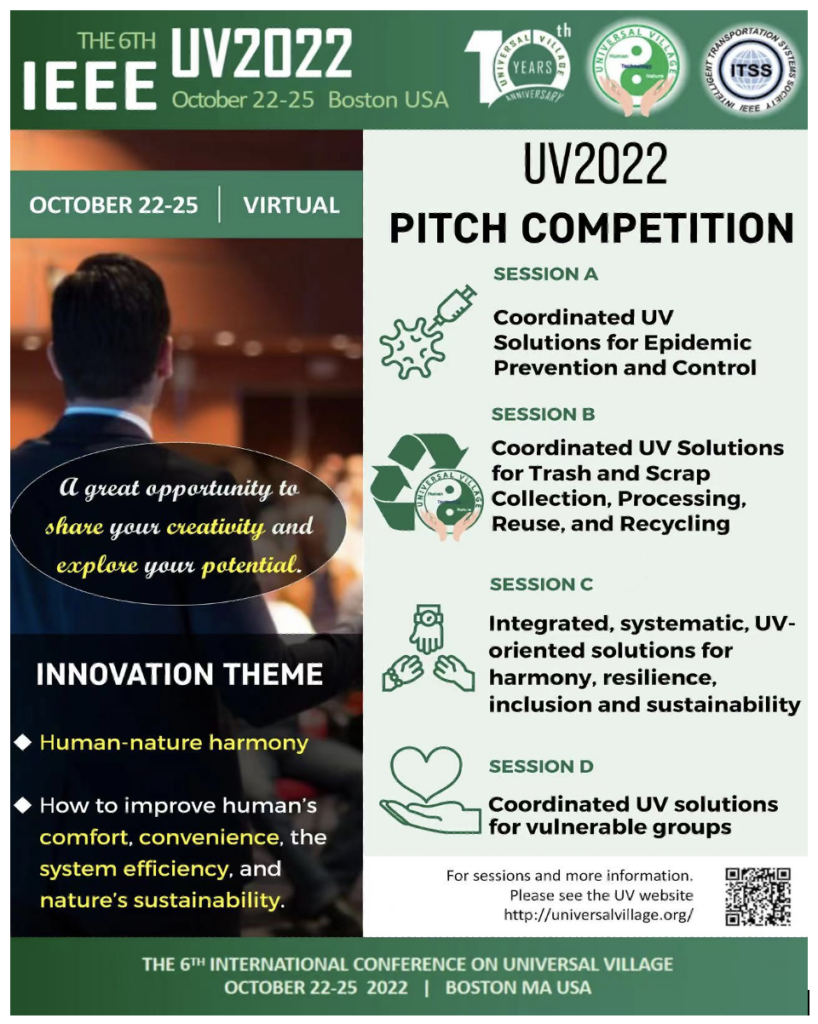
Introduction:
Universal Village (UV) is a new concept proposed by MIT’s UV program. UV exemplifies an ideal future society that addresses the current challenges cities are facing in the process of development and pursues harmony between humans and nature through the wise use of advanced technologies.
At the present time, rapid urbanization is bringing convenience with high efficiency to our daily lives, but the increase in GDP has come with the cost of high metabolic rates, high waste per capita, a severe lack of resources, heavy pollution, and waste siege. Furthermore, this lifestyle supported by environmental degradation and soaring resource consumption is not improving our health and wellbeing. According to a report in the European Journal of Preventive Cardiology in 2013, today’s adults are less healthy than their counterparts of previous generations.
Current smart city solutions cannot fundamentally solve these problems, and they sometimes bring about unintended complications or paradoxical consequences. Subsystems of current smart cities, such as Smart Healthcare and Smart Homes, are still designed independently without considering the potential interaction among these subsystems. In conclusion, present smart cities are not capable of providing an integrated, coordinated and inclusive solution for our future sustainable development.
The UV concept is aimed at focusing our attention to these challenges and making us reflect on our path of development. International Conferences on UV are expected to establish an international platform for interdisciplinary collaboration on UV development, including theoretical exploration, scientific research, and framework design. UV International Conferences call for representatives from academia, industry, civil society and government to share their achievements and visions in various research areas and their perspectives on how to address these global challenges.
In response to the calling of UV International Conferences, UV Student Forum has been founded to increase awareness among the young generation about the challenges and dilemmas humans are facing, cultivate young people’s creativity and leadership, encourage students’ entrepreneurial enthusiasm, and contribute to building a better world. With these goals in mind, UV2022 aims to promote Pitch Competition and welcomes all innovative ideas.
The UV Pitch Competition Committee, consisting of academic researchers, seasoned business professionals, renowned entrepreneurs, and students with entrepreneurial experience, will follow this development blueprint: UV vision and subsystems introduction, entrepreneurship basic knowledge training, brainstorming and research guidance, and innovation incubation. The committee’s goal is to help raise participants’ consciousness about improving human comfort, convenience, and efficiency, as well as pursuing harmony between humans and nature. Participants will be encouraged to focus on the needs of different people, come up with ideas, develop these ideas and design products, and ultimately pursue their dream of entrepreneurship. The UV Committee will guide willing participants to complete the process of project planning, design drafting, and product research and development in order to enable these creative ideas to better serve our society in harmony with nature.
The COVID-19 pandemic is a serious global health threat that has led to an unparalleled global economic shock. It is not only challenging our medical systems, pandemic management systems, emergency response systems, transportation management & logistics management systems, home and community management systems, energy management systems, infrastructure systems as well as humanity systems, but also dramatically changing our lifestyles. We welcome you and your team to share your visions on the following topics. Together, we will finally win the battle against the biggest crisis so far of the 21st century, the COVID-19 pandemic.
- Crowdsourcing, data collection, and visualization
- Epidemic prediction and contact tracing
- Coordinated operational management across all levels during emergencies
- Smart resource allocation
- Quarantine management
- Smart medical waste processing
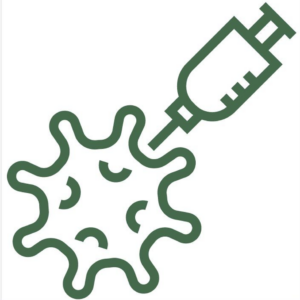
Session B: Coordinated UV Solutions for Trash and Scrap Collection, Processing, Reuse, and Recycling
According to the 2018 World Bank Report on Waste Management, the world generated 2.01 billion tons of municipal solid waste in 2016 (around 227kg per person). High-income countries account for only 16% of the world’s population but produce 34% of the world’s waste. The report estimates that annual global waste production will increase by 70% if current conditions persist. The issue of waste pollution and waste siege poses a great threat to both human survival and the global environment. We invite you and your team to share your vision on the following topics. Together, we will seek solutions for trash and scrap collection, processing, reuse, and recycling.
- Crowdsourcing, data collection, and visualization for material cycles
- Smart residential trash and industrial scrap collection and transportation: smart trash cans and their optimal placement; smart garbage trucks; smart trash and scrap collection systems and their interactions with cultural and economic factors; development of innovative lifestyles, public awareness and community engagement
- Material cycles optimization: smart waste management; smart trash and scrap processing, reuse and recycling; smart platform development for coordinated information sharing among smart recycling, user feedback on products, and smart manufacturing
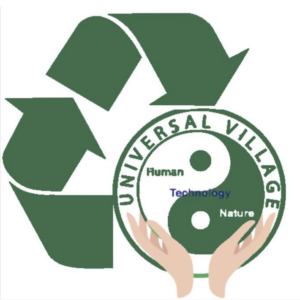
UV exemplifies an ideal future society that pursues harmony between humans and nature through the wise use of advanced technologies. The theme of IEEE UV2022 is “Seeking integrated, systematic, UV-oriented solutions for harmony, resilience, inclusion and sustainability.” We invite you and your team to share your vision on UV concepts and UV subsystems:
UV SUBSYSTEMS
-
- Smart Home and Community
- Smart Medicine and Healthcare
- ITS, Urban Planning and Crowd management
- Smart Energy Management
- Smart City Infrastructure
- Smart Response System for City Emergency
- Smart Environment Protection
- Smart Humanity
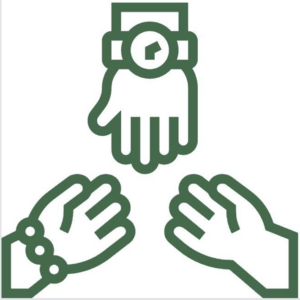
As our society is proudly marching into the era of AI, researchers are adopting AI technologies to innovate lifestyles and improve quality of our life. However, the needs of vulnerable groups are not widely noticed and addressed. Moreover, the COVID-19 pandemic has not only caused a worldwide health crisis, but also deepened existing inequalities, and “has exacerbated the vulnerability of the least protected in society” (United Nations, 2020)
Vulnerable groups include, but are not limited to the following categories:
1) People with disability or certain medical conditions, such as chronic disease, severe mental illness, human immunodeficiency virus (HIV), and drug and alcohol addiction;
2) People with disadvantaged socioeconomic status, including the isolated elderly and children and populations that are uninsured or underinsured, low-income, and/or homeless;
3) Marginalized populations, including racial and ethnic minorities and ex-prisoners.
Members of vulnerable groups often have health conditions that are exacerbated by inadequate healthcare and experience significant disparities in life expectancy, morbidity, and mortality. It is estimated that over 1 billion people experience disability, which accounts for around 15 percent of the world’s population.
Together, we will seek solutions to assist vulnerable groups to:
-
- Have equal access to different resources,
- Improve their health conditions and quality of life, and
- Achieve self-actualization
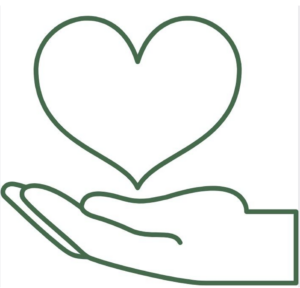
UV Subsystems
- Smart Home and Community
- Smart Medicine and Healthcare
- ITS, Urban Planning and Crowd management
- Smart Energy Management
- Smart City Infrastructure
- Smart Response System for City Emergency
- Smart Environment Protection
- Smart Humanity
UV Impacting Factors
- Information Flow
- Material Cycle
- Community
- Lifestyle


